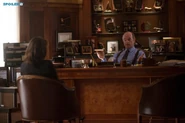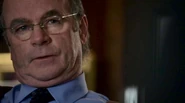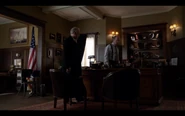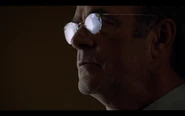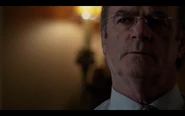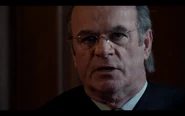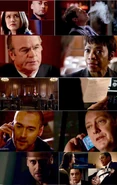No edit summary Tag: Visual edit |
No edit summary Tag: Visual edit |
||
| Line 49: | Line 49: | ||
Reven Wright informed Denner that the Thomas Connolly is now involved. Denner remained impassive and demanded that the Thomas Connolly make a personal appearance. When [[Tom Keen (Character)|Tom Keen]] surrenders himself to protect Elizabeth; he confesses to the murder of the harbor master and claims Liz had no involvement and even tried to stop him from committing the murder. Even with evidence that Liz was not guilty for the murder, Denner planned to charge Keen with perjury and kidnapping. He learns that Tom is still in love with her. |
Reven Wright informed Denner that the Thomas Connolly is now involved. Denner remained impassive and demanded that the Thomas Connolly make a personal appearance. When [[Tom Keen (Character)|Tom Keen]] surrenders himself to protect Elizabeth; he confesses to the murder of the harbor master and claims Liz had no involvement and even tried to stop him from committing the murder. Even with evidence that Liz was not guilty for the murder, Denner planned to charge Keen with perjury and kidnapping. He learns that Tom is still in love with her. |
||
| − | [[Thomas Connolly]] arrives and orders Denner to end the inquiry. Connolly tells Denner that he had “crossed the line” and accessed classified information without legal authority, having ignored the United States Foreign Intelligence Surveillance Court. Connolly threatens to charge Denner with the violation of federal laws regarding national security regulations. Denner is sickened at the option of folding to threats and legitimizing government secrecy, but Thomas made it clear to Denner that if he refused the order, Denner would be indicted. Denner asked if the [[Post Office]] Task Force is that important to Connolly, Connolly replied that he does not know what that is and neither does Denner. Connolly states that Denner “crossed the line” and he is willing to “move past it”. As he was leaving, Connolly mocked Denner and let him know that if he made the right decision, then as Attorney General, Denner will be appointed to a “real court”. |
+ | [[Thomas Connolly]] arrives and orders Denner to end the inquiry. Connolly tells Denner that he had “crossed the line” and accessed classified information without legal authority, having ignored the United States Foreign Intelligence Surveillance Court. Connolly threatens to charge Denner with the violation of federal laws regarding national security regulations. Denner is sickened at the option of folding to threats and legitimizing government secrecy, but Thomas made it clear to Denner that if he refused the order, Denner would be indicted and his career would be destroyed. Denner asked if the [[Post Office]] Task Force is that important to Connolly, Connolly replied that he does not know what that is and neither does Denner. Connolly states that Denner “crossed the line” and he is willing to “move past it”. As he was leaving, Connolly mocked Denner and let him know that if he made the right decision, then as Attorney General, Denner will be appointed to a “real court”. |
Appearing before the court, he told the participants not to rise as the government had shown its contempt for the rule of law. Denner gives a speech on the importance of upholding the United States Constitution. Declaring that if Keen or Cooper testify, it will endanger national security, he ends the enquiry. When [[Brad Marking]] and [[Martin Wilcox]] object to the injustice, he makes it clear that they are low-level employees in the federal government and have no power over this case. Wilcox’s outrage is ignored and Wilcox is ordered to accept the ruling. Marking quickly accepts the defeat. Denner reminded [[Elizabeth Keen]] about her duty to enforce the law and to let the good work she does be in some way a tribute to Eugene Ames’s memory. |
Appearing before the court, he told the participants not to rise as the government had shown its contempt for the rule of law. Denner gives a speech on the importance of upholding the United States Constitution. Declaring that if Keen or Cooper testify, it will endanger national security, he ends the enquiry. When [[Brad Marking]] and [[Martin Wilcox]] object to the injustice, he makes it clear that they are low-level employees in the federal government and have no power over this case. Wilcox’s outrage is ignored and Wilcox is ordered to accept the ruling. Marking quickly accepts the defeat. Denner reminded [[Elizabeth Keen]] about her duty to enforce the law and to let the good work she does be in some way a tribute to Eugene Ames’s memory. |
||
Revision as of 19:01, 29 May 2019
Richard Denner is a character in NBC’s The Blacklist.
Background
Richard has a history with Reven Wright and Thomas Connolly. He always saw Thomas as a “smug bastard” while Thomas always saw Richard as a “paranoid self-righteous prick”.
He is a former criminal defense attorney, as well as a former Berkeley law professor. He is an advocate for government transparency.
He has been a judge for 30 years and learned that the Department of Justice’s “barks” were far worse than their “bites”.
According to Thomas Connolly, Denner has been considered “insane” by the Beltway for years. The reason for this “insanity” is never revealed.
Denner viewed the “national security” excuse as the greatest threat to the United States Constitution.
During Keen's case, he was willing to humiliate the government, as he was to expose the immunity agreement made between the Department of Justice and their most wanted man.
Season 2
“The Major”
He is specifically requested by Marking due to his hatred of government secrecy and the “national security” excuse. Denner agrees to the request despite knowing that he is legally exceeding his authority. At the beginning of the inquiry, Richard dismissed Reven Wright’s warnings that he was making a legal mistake. During the enquiry he was openly biased against Reven’s objections.
During the in-camera hearing with Elizabeth Keen and Harold Cooper, he broke federal laws and threatened them with incarceration. He learned about the Task Force and the immunity agreement with Raymond Reddington.
Wilcox shows Denner a bullet from the crime scene that links Keen’s handgun to the murder.
“Tom Keen”
Reven Wright informed Denner that the Thomas Connolly is now involved. Denner remained impassive and demanded that the Thomas Connolly make a personal appearance. When Tom Keen surrenders himself to protect Elizabeth; he confesses to the murder of the harbor master and claims Liz had no involvement and even tried to stop him from committing the murder. Even with evidence that Liz was not guilty for the murder, Denner planned to charge Keen with perjury and kidnapping. He learns that Tom is still in love with her.
Thomas Connolly arrives and orders Denner to end the inquiry. Connolly tells Denner that he had “crossed the line” and accessed classified information without legal authority, having ignored the United States Foreign Intelligence Surveillance Court. Connolly threatens to charge Denner with the violation of federal laws regarding national security regulations. Denner is sickened at the option of folding to threats and legitimizing government secrecy, but Thomas made it clear to Denner that if he refused the order, Denner would be indicted and his career would be destroyed. Denner asked if the Post Office Task Force is that important to Connolly, Connolly replied that he does not know what that is and neither does Denner. Connolly states that Denner “crossed the line” and he is willing to “move past it”. As he was leaving, Connolly mocked Denner and let him know that if he made the right decision, then as Attorney General, Denner will be appointed to a “real court”.
Appearing before the court, he told the participants not to rise as the government had shown its contempt for the rule of law. Denner gives a speech on the importance of upholding the United States Constitution. Declaring that if Keen or Cooper testify, it will endanger national security, he ends the enquiry. When Brad Marking and Martin Wilcox object to the injustice, he makes it clear that they are low-level employees in the federal government and have no power over this case. Wilcox’s outrage is ignored and Wilcox is ordered to accept the ruling. Marking quickly accepts the defeat. Denner reminded Elizabeth Keen about her duty to enforce the law and to let the good work she does be in some way a tribute to Eugene Ames’s memory.
After the inquiry ends, Connolly reveals to Elizabeth that Denner never had a case against her, he only needed to intervene because of Denner’s bias against the government. In addition, he reveals he had Tom released from custody before leaving.
Unanswered Questions
- Why is Denner opposed to government secrecy?
- Why did Denner break federal law?
- A: Most likely he believed that the government would not retaliate.

